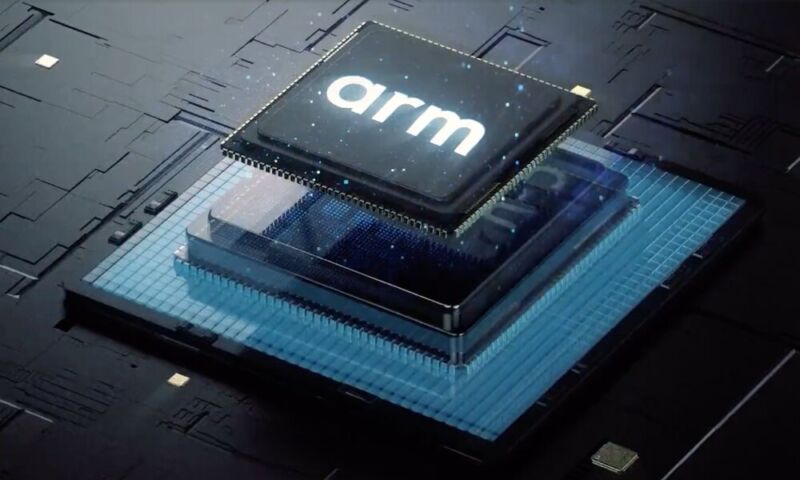
Enlarge (credit: Arm)
What's in store for the future of Arm? The company's owner, Softbank, has been in financial trouble lately, and that has caused Arm to bounce from one dramatic possibility to another. Initially Arm was put up for sale, and Nvidia was the front-runner to buy the company. That plan was shut down by regulators, and now "Plan B" is an IPO, which is supposed to happen on the NYSE sometime this year. If you want to succeed on the stock market, you've got to show revenue, and while Arm enables the sale of billions of dollars of devices around the world, the company's chip licensing scheme only brings in a comparatively small amount of money—around $500 million a quarter.
The Financial Times has a report on Arm's "radical shake-up" of its business model. The new plan is to raise prices across the board and charge "several times more" than it currently does for chip licenses. According to the report, Arm wants to stop charging chip vendors to make Arm chips, and instead wants to charge device makers—especially smartphone manufacturers—a fee based on the overall price of the final product.
Let's say Motorola makes a phone with a Qualcomm Snapdragon Arm chip. Previously, Qualcomm would have signed a deal with Arm for an Arm license, and that license would extend to anyone that buys a Qualcomm Arm chip, like Motorola. Qualcomm contributes a lot to its own chip designs, but when it comes to the Arm license it is basically an Arm reseller. Arm would now want a licensing fee from Motorola (and not Qualcomm?), and it would ask Qualcomm to not sell chips to anyone that doesn't have a licensing agreement with Arm.
Read 6 remaining paragraphs | Comments

Enlarge (credit: Arm)
What's in store for the future of Arm? The company's owner, Softbank, has been in financial trouble lately, and that has caused Arm to bounce from one dramatic possibility to another. Initially Arm was put up for sale, and Nvidia was the front-runner to buy the company. That plan was shut down by regulators, and now "Plan B" is an IPO, which is supposed to happen on the NYSE sometime this year. If you want to succeed on the stock market, you've got to show revenue, and while Arm enables the sale of billions of dollars of devices around the world, the company's chip licensing scheme only brings in a comparatively small amount of money—around $500 million a quarter.
The Financial Times has a report on Arm's "radical shake-up" of its business model. The new plan is to raise prices across the board and charge "several times more" than it currently does for chip licenses. According to the report, Arm wants to stop charging chip vendors to make Arm chips, and instead wants to charge device makers—especially smartphone manufacturers—a fee based on the overall price of the final product.
Let's say Motorola makes a phone with a Qualcomm Snapdragon Arm chip. Previously, Qualcomm would have signed a deal with Arm for an Arm license, and that license would extend to anyone that buys a Qualcomm Arm chip, like Motorola. Qualcomm contributes a lot to its own chip designs, but when it comes to the Arm license it is basically an Arm reseller. Arm would now want a licensing fee from Motorola (and not Qualcomm?), and it would ask Qualcomm to not sell chips to anyone that doesn't have a licensing agreement with Arm.
Read 6 remaining paragraphs | Comments
March 24, 2023 at 10:49PM

Post a Comment